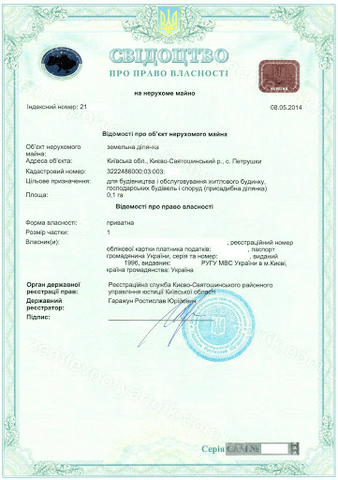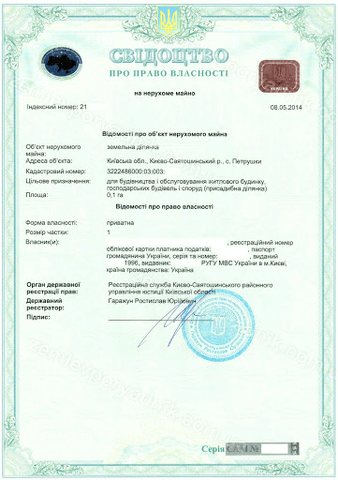How to protect yourself when renting land in Ukraine: everything you need to know about concluding a lease agreement
Cost of services:
Reviews of our Clients
Land leasing holds significant importance within the context of expanding the agricultural and industrial sectors, which are rapidly developing in Ukraine. When clients, looking to lease out or rent land, consult a lawyer specializing in land law, they have a variety of concerns, including the most frequently asked questions such as:
- What specific documents are required for leasing land?
- How can the rights of both lessees and lessors be effectively protected to avoid risky situations?
- What terms should be included in a land lease agreement, and what considerations are crucial when drafting it?
- How should the lease payment for a land plot be determined?
Guided by our experience, we aim to address these inquiries and meticulously examine the critical legal aspects of land leasing, with a focus on safeguarding the rights and obligations of all involved parties.
For personalized advice on land leasing in Ukraine, reach out to our experts in land law. We not only offer comprehensive guidance and prepare all necessary documentation but also represent our clients in all issues related to land leasing. With our support, any agreement is secured, and legal matters are resolved simply and efficiently.
You may also like: Leasing State-Owned and Municipal Land: How to Properly Formalize the Deal?
The Rights and Obligations of Parties in Land Leasing
Land leasing in Ukraine is governed by legislation that regulates the relationships between landlords and tenants. Our lawyers often encounter clients who overlooked important aspects when signing a lease agreement and now face the need for modifications. However, these changes now require a negotiation process and agreement, so it's best to anticipate and settle all matters at the outset. The leasing process encompasses various aspects, such as defining the lease term and payment amount, along with other transaction conditions. Thus, this matter demands thorough examination and adherence to all legislative requirements, ensuring legal security for the parties entering into a land lease agreement and the overall reliability of the conditions.
To execute a lease agreement, the following basic documents are necessary:
- An identity document or power of attorney (for the tenant or landlord);
- The taxpayer identification number;
- For legal entities, the required documents include the founding documents, an extract from the Unified State Register of Legal Entities, Individual Entrepreneurs, and Public Organizations, a directive for the appointment of the director, decisions from the general assembly, and so forth;
- An extract from the State Land Cadastre and an extract from the real rights register of the landlord.
In finalizing a lease agreement, it's imperative for the parties to clearly understand their rights and duties. Here's a succinct explanation of the fundamental aspects of such an agreement: It is an arrangement between the property owner and an individual intending to use this property. The user is granted the right to own and use the property over a specified period, against a predetermined sum.
Clients frequently question who has the authority to manage the property and lease it out. The answer hinges not just on legal regulations but also on the specifics of the agreement and the user's rights under the initial agreement—whether they are allowed to dispose of the property and in what manner (lease, sublease, etc.). Essentially, both the property owner and the user of the plot have the capacity to lease out the property.
How to Determine Rent in Land Leasing?
In the context of determining the size of rent payments, regulation exists in two forms:
- Normatively, as directly stipulated by legislation for specific types of property;
- Contractually, as agreed upon by the parties involved.
Thus, when preparing agreements for clients and providing procedural support for agreements on establishing usage rights (such as leasing, easements, superficies, subleasing, etc.), we consistently consider the following requirements.
It's essential for a land lease agreement to precisely define the conditions and frequency for revising the rent amount, including adjustments or indexing. Additionally, in times of military conflict, it is prudent to incorporate a provision in the agreement allowing for a reduction in payments if usage of the property is complicated by factors beyond the parties' control, or for suspending rent payments when the property cannot be utilized due to circumstances the tenant is not responsible for (like mined fields or occupation).
It is noteworthy that generally, if not specified otherwise in the land lease agreement, upon a change in property ownership, the rights and duties of the landlord transfer to the new owner. These are the fundamental requirements for a lease agreement. However, given the special value of land as real estate, its leasing might also need to comply with specific legislative stipulations governing the transfer of usage rights.
You may also like: Procedures for Claiming Land Ownership in Ukraine
On the Land Lease Agreement: Agreement Form, Commencement, Essential Terms, Lease Term Duration
Land leasing may seem like a complex process, but it's essential to understand the conditions, rights, and obligations that should be negotiated upon entering into an agreement. Let's explore the key points in greater detail.
The fundamental conditions that must be specified in the lease agreement concerning the leased object include the identification of the land plot by its cadastral number, its location, and size. Equally important is to state the lease's start and end dates, the rent amount, the payment procedure, and the terms for its revision by both parties.
Legal provision exists for leasing multiple plots under a single agreement when there is only one lessor. In such instances, the agreement's subject description will list the number of cadastral numbers for the plots to which the right of use is being granted.
The agreement may stipulate additional conditions, such as:
- Reimbursement for expenses related to the security and improvement of the land plot.
- Details of a preliminary lease (sublease) agreement if it involves an exchange of rights for the use of agricultural plots.
- Conditions for maintaining shelterbelts and their agroforestry melioration.
- Extra conditions if the plot includes a water body, in which case a water body passport becomes an integral part of the agreement.
We always emphasize to our clients that when a land lease agreement is made, the law explicitly requires it to be in written form, as the agreement is considered executed once the parties have agreed on all essential terms.
An important aspect of finalizing the lease agreement is the date when rights and obligations commence, which is specifically from the date such a lease right is registered in the State Register of Rights. Although the registration date in the registry may not align with the agreement's signing date, the lease agreement's expiration date is calculated from the date of signing.
Clients often seek consultations regarding their acquisition of lease rights on land plots beneath the real estate they have purchased. In such cases, we examine the situation from two aspects:
- Was the plot previously leased to the former owner? If so, the rights to use the land plot are transferred to the new real estate owner.
- If the rights were not formalized for the previous owner, the land plot needs to be allocated for future use by the new owner.
Therefore, any attempt to use the land plot without formalizing the right of private ownership, perpetual use, or leasing of the land plot constitutes unauthorized land occupation.
If you're looking to lease or rent out a land plot in Ukraine and want to ensure the agreement is as secure as possible, we recommend seeking qualified assistance from our legal firm. We offer a comprehensive range of services:
- Gathering the necessary documents for the proper conclusion of the lease agreement.
- Drafting the land lease agreement, considering the requirements of all parties and the relevant legislation.
- Ensuring the registration of the lease right in a special registry.
Moreover, our team of highly qualified lawyers has significant experience interacting with the relevant authorities and registration institutions, simplifying the process of obtaining necessary permits and registering lease rights.
We guarantee a personalized approach to each client, considering their unique needs and transaction specifics.
Learn more about our services in land law here.
Our clients







